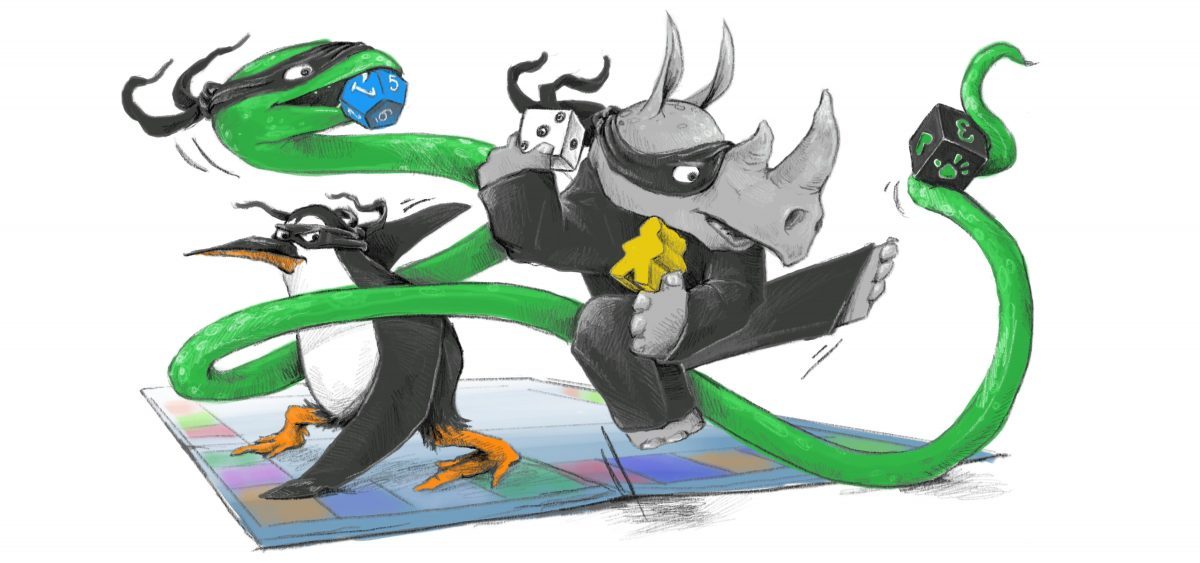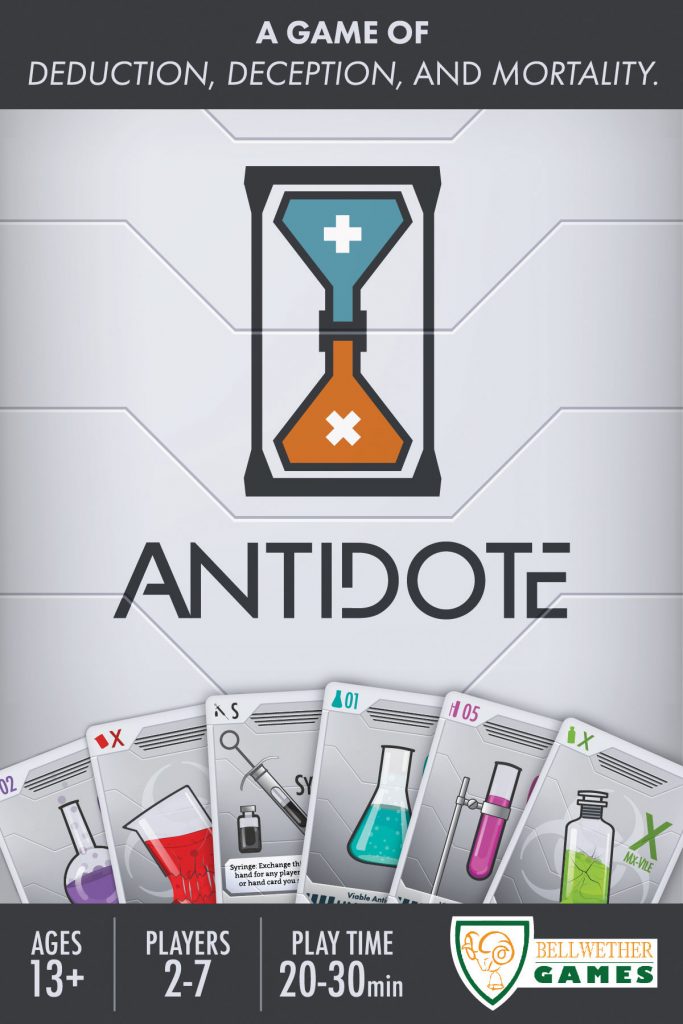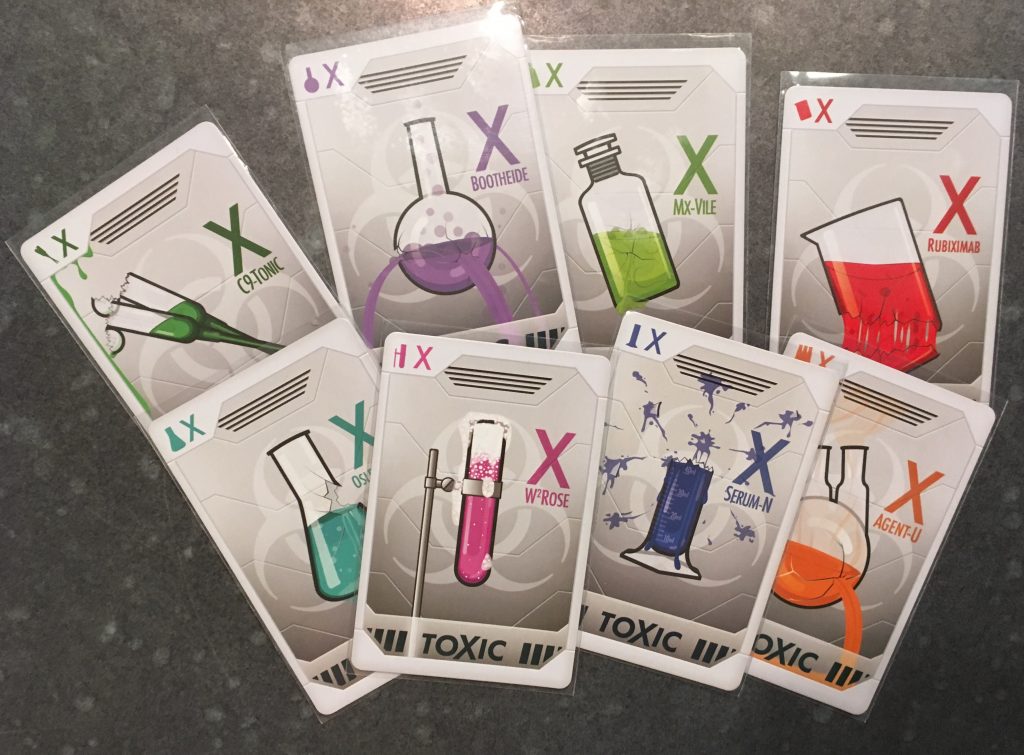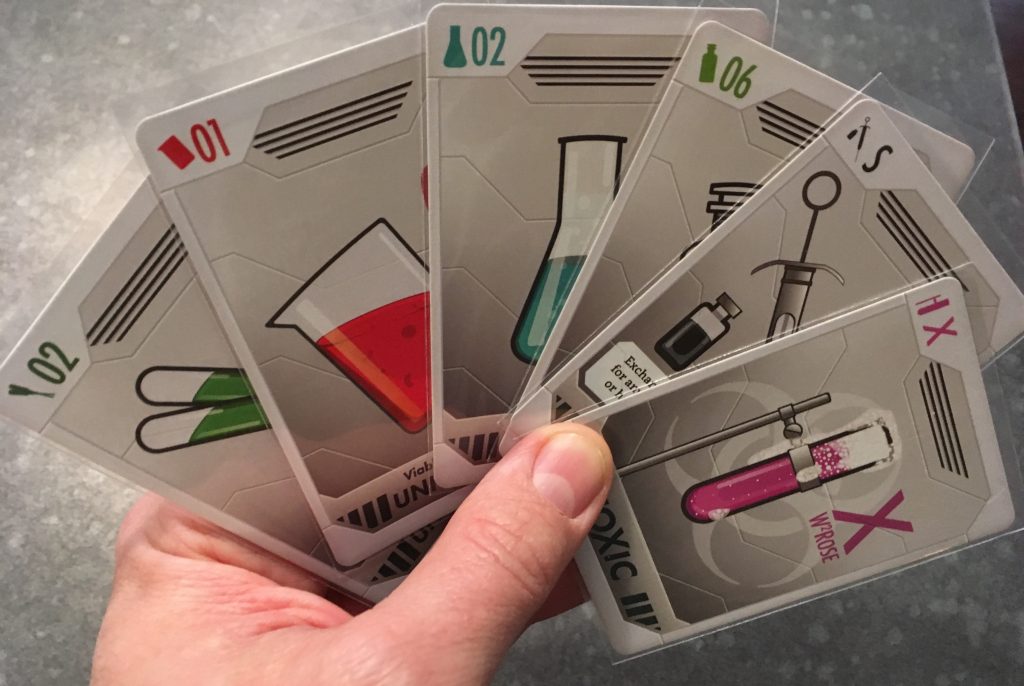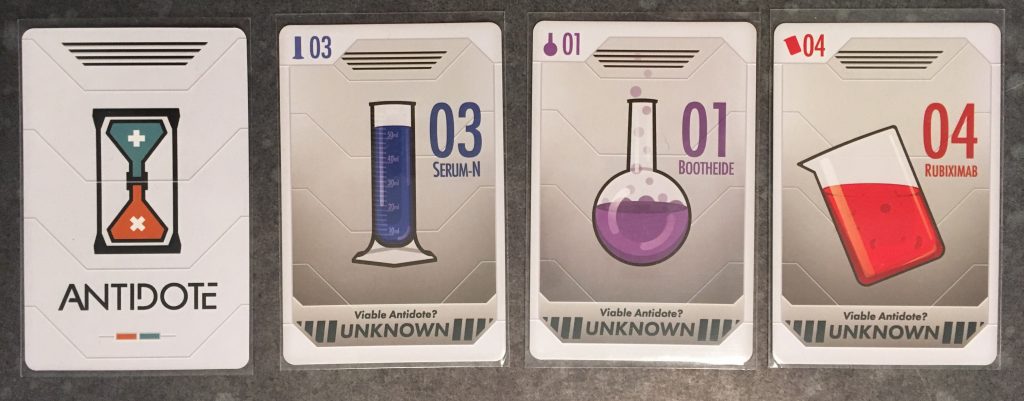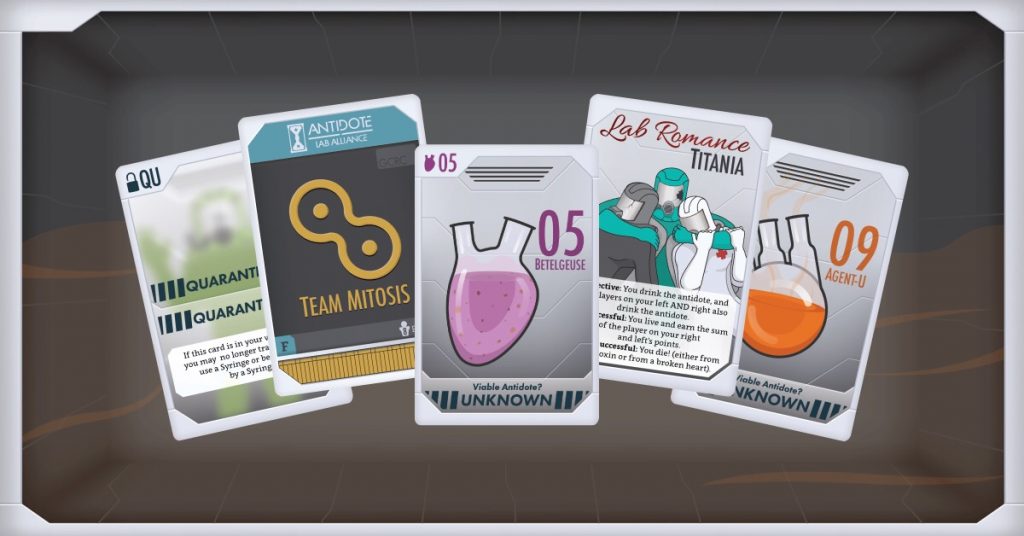So, you and your friends are working in the lab one night, when some idiot (you know the one) drops a vial containing a hideous toxin. Not to worry, there’s an antidote. Only…you don’t know which toxin was dropped, because the idiot wasn’t following proper protocols. Not you have to hurry, and by the way there isn’t enough antidote for everyone, so maybe you shouldn’t share all of your knowledge until you are sure who you can trust.
Antidote is a deduction card game where you are trying to figure out which of 7 formulas is the toxin (8 with seven players) and have a card matching that formula in your hand at the end of the game.
Setup and Gameplay
First of all you have to determine what the toxin will be, without anyone knowing. You do this by shuffling all of the “X” cards together and choosing one at random to be the toxin.
No one looks at it and it is set aside under the game box until the end of the game. You then shuffle a certain number of Syringe cards in with the “X” cards and deal them out to all players. You also shuffle and deal out a predetermined number of formula cards (don’t worry, there’s a chart for this) to all players and then you are ready to play.
You may only look at the cards you have in your hand, but the good thing is, there is no restriction as to what you can say about your cards. You just can’t show them to anyone.
During the game you are basically trying to lay your eyes on as many “X” cards as you can. If you see an “X” card in the game, then it can’t be the one under the game box and is therefore not the toxin. So…no need to be hoarding cards matching that formula. At the end of the game you will only have 1 card left in your hand, and you want it to match the formula that is hidden under the game box. If it does…Huzzah! You live! If not…well, maybe you weren’t that great of a scientist after all.
So, how does the gameplay work? On your turn, you have 3 options. You can Trade Research, use a Syringe card, or call for everyone to Discard a card.
Trading Research can be done in one of two ways. You can tell all players to pass a card either to their left or their right. Everyone then takes a card from their hand and passes it facedown in the direction indicated and then adds the one they were given to their own hand. You can also choose to trade directly with one other player one to one. The other player has to agree to the trade, and again the cards go from your hand to the other player’s hand. If they refuse the trade, you get to choose a different action.
Calling for everyone to discard a card forces everyone to take one card from their hand and place it directly in front of them in a area called their “workstation.”
Any “X” cards are placed in the workstation face down, all other cards are placed face up. This allows everyone else to see what cards you feel like you no longer want in your hand. Maybe this means you have information that tells you those cards are not the antidote, or maybe you are throwing them off the scent. (Maybe you just like to screw with people). The other thing that this does is to speed the game towards its end. When everyone is down to 1 card left in their hand, the game ends, so be very careful about how many times you randomly decide to discards cards.
Using a Syringe card allows you to steal a card from another player, either from their hand or their workstation. If it is from their hand, it is chosen at random, and you give them the Syringe, allowing them to perform the same action later. If it is from their workstation, you choose the card you want, and then replace it with the Syringe face up in their workstation. The best way to use the Syringe is to steal a face down “X” card from someone’s workstation, thereby giving you another clue as to what the toxin might be.
So, the game continues until everyone is down to 1 card in their hand and the game ends. At that point, you reveal the hidden toxin. Whoever’s card matches the formula on the secret card survives and scores points equal to the value listed on the card in their hand. Whoever’s card doesn’t match dies and loses points equal to the value. You play 3 rounds and whoever has the most points wins.
So…thoughts?
First, let’s just say that I really like the look and feel of the game. The artwork for Antidote is really top notch. Mostly this is because it is really not trying to do to much, and therefore doesn’t take away from the gameplay. It is clean and even has little symbols in the corners to differentiate between the formulas since some of them are very similar in color. The cards may need to be sleeved though, since they are not super thick and you wouldn’t want one of two to start showing wear and give away any information. (They are incredibly thin, just a thought that came in my head).
The gameplay in Antidote is really very streamlined. Your choices are clear and you learn very early the advantages of each option. It didn’t take a lot of explanation for everyone to jump right in and start playing. Our first game was with a group of 6 and everyone clued in very quickly. We did have to start over midway through the first round because I failed to tell them that the “Agent U” cards were not used, but were listed on the player aid (completely my fault, sorry guys).
I really did enjoy this game, and i think the more i play it, I will like it even more. There does seem to be an advantage to playing it a number of times. You get used to the actions and don’t just go so much off of guessing.
The gameplay in Antidote really depends on the group. If the group is very methodical then it will take a long time and you can have a chance of figuring out what the antidote is. If they are not….
When I played it with a bunch of first timers, they were calling for discards really often, which shortened the game considerably. Me and a couple of others were trying to deduce what the cards were and figure out what was going on, while they were mostly just hoping for some good luck. Just when I thought I had a handle on what the card was, the game was over. One of my friends said that he had it narrowed down to one of 2 possibilities, but neither of us got to act on our reasoning before someone ended the game. I happened to guess right and score 5 points, but there was little satisfaction because I had indeed guessed.
A group of experienced players will probably allow the game to go on a little longer. Also, you will be able to tell when someone has a feel for what the hidden card is. If you are not even close, then you can try to end the game before they can get one of the right cards in their hand, even if it means that you won’t score this round. That kind of play I would be happy with, at least there is a strategy to it, but blindly ending the game at random (or speeding it to its end) kinda of left me wanting.
This is where the expansions come in.
Expansions:
With some games the expansions are either unnecessary or seem like afterthoughts. This is not the case with Antidote. The expansions take an already deep game and make it oh so much better.
First, the new expansion pack adds an 8th and a 9th player to the mix.
But, the most immediate and positive effect of the expansions is that it gets people talking more, and sharing information more. The added interaction is almost necessary.
One of the only negative situations that arose during our plays of the original game was when someone didn’t feel they were really deducing anything from the gameplay and just started discarding every round. This led to the game being over far sooner than it should have and thus no one found the antidote.
The Lab ID cards that were included in the original Kickstarter were a fine start, causing you to share information about the formala you were “working” on if you believed it to be the antidote, or if you found out that it definitely was not the antidote.
The Lab Romance expansion cards that were in the original Kickstarter and also force you to interact since you are given a role and are often trying to save someone else in addition to yourself. (Bonus points for the Shakespeare references). The new expansion adds even more cards to this version of the game, bringing the total to 16 possible romantic complications. The gameplay is the same, except now you get to draw 2 cards and choose 1, allowing you to have more control over who you fall for at work.
The Adrenaline cards add more card passing of cards, allowing you to see more of the cards during each round. It also adds the Quarantine card which locks a player down when it is discarded to their workstation, forcing them to always call for a discard during their turn, and speeding up the end of the game. Truth Serum cards force you to answer honestly about cards and actions when someone questions you. All of these additions bring a little extra something to the game and seem to be easy enough to include, although the Quarantine can come out way too soon and screw you up early, but it has to be discarded through normal gameplay, so hopefully you can prevent this from happening.
But the Lab Alliance cards in the new expansion may be my favorite. They allow for you to form teams in order to figure out what the hidden card is and thus the antidote.
In the Lab Alliance expansion, everyone’s cards are visible, so everyone knows what the teams are. In the Double Blind expansion, all team cards are left face down, so you never know whose team you are on, until you work it out. If you thought it was hard before…
The good thing is that no matter which of the expansions you choose to play with, you will not be disappointed. Each one adds its own element to the gameplay, and I haven’t found any of these elements to be negative, except maybe the Quarantine. I’m not sure I like someone being excluded from further choices, but since you get to choose when to discard it, you can hold on to it and hope someone steals it randomly from your hand using the Syringe card.
I love the team aspect in the Alliance expansion, especially the Double Blind where you have no idea whose team you are on. It leads to code words and winks and nods and treachery. Everything you want in a hidden role deduction game.
Basically if you haven’t played Antidote before, you should try it, at least a couple of times. If you have played it before and remotely enjoyed it, you HAVE to get this expansion. It takes a good game and makes it great.
Ninja Approved.
Bellweather Games sent us a (sleeved) copy of Antidote and its expansion in exchange for an honest review, which is exactly what we provided.
